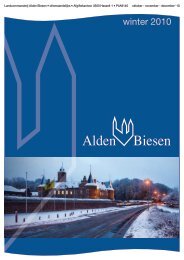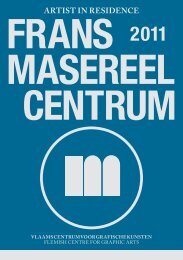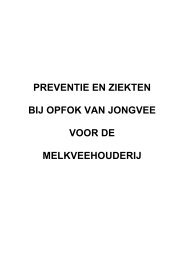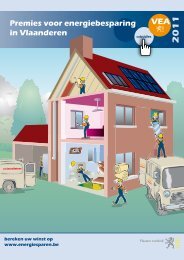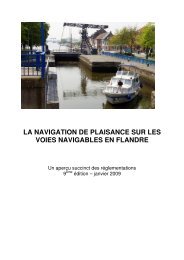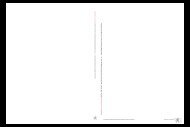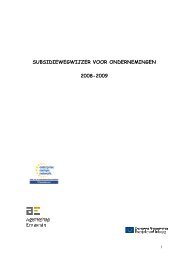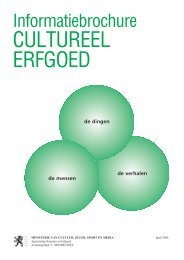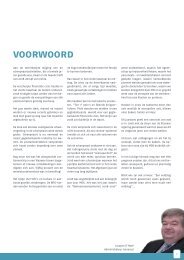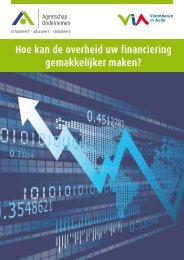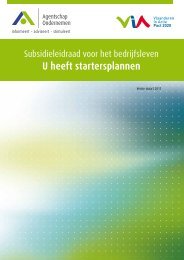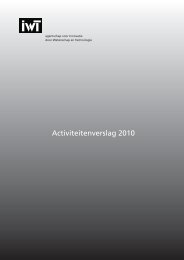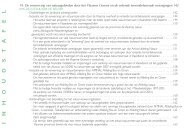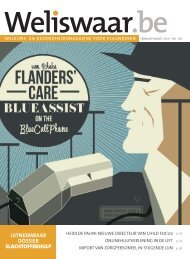Acknowledgements Book of abstracts - Publicaties - Vlaanderen.be
Acknowledgements Book of abstracts - Publicaties - Vlaanderen.be
Acknowledgements Book of abstracts - Publicaties - Vlaanderen.be
Create successful ePaper yourself
Turn your PDF publications into a flip-book with our unique Google optimized e-Paper software.
Welcome address<br />
One prerequisite for ensuring and improving the quality <strong>of</strong> life <strong>of</strong> animals is the development <strong>of</strong><br />
scientifically robust methods for assessing their welfare. There is little doubt that a pet owner who<br />
pays a lot <strong>of</strong> attention to his individual animal may somehow know, almost intuitively, how this<br />
particular animal fares and feels. The specific criteria used to come to this evaluation are hard to<br />
pin-point. They tend to vary depending on the context, the animal and the pet owner. The emphasis<br />
<strong>of</strong> this congress, however, is on the assessment <strong>of</strong> animal welfare at the level <strong>of</strong> the population<br />
instead <strong>of</strong> the individual animal. For advising farmers on how to house and manage their animals,<br />
for drafting and implementing legislation and codes <strong>of</strong> practice for the keeping <strong>of</strong> laboratory<br />
animals, for improving the living circumstances <strong>of</strong> zoo animals, for la<strong>be</strong>lling consumption products<br />
according to the animal welfare status during production, … scientifically robust methods for<br />
assessing the welfare <strong>of</strong> a group <strong>of</strong> animals are needed. The validity, reliability, applicability,<br />
strengths and weaknesses <strong>of</strong> these methods ought to <strong>be</strong> discussed, peer-reviewed and – hopefully –<br />
agreed upon by the relevant scientific community. The International Workshop on the Assessment<br />
<strong>of</strong> Animal Welfare at Farm and Group Level (WAFL) <strong>of</strong>fers this opportunity.<br />
WAFL was organised first in Copenhagen in 1999, subsequently in Bristol in 2002 and in Vienna in<br />
2005. The num<strong>be</strong>r <strong>of</strong> congress participants increased from about 40 in 1999 to 100 in 2002 and 195<br />
in 2005 confirming the growing popularity <strong>of</strong>, and demand for this congress. With 28 oral<br />
presentations, 62 posters and a small working group session during a single afternoon only, WAFL-<br />
2005 continued to evolve from an international workshop to a proper scientific congress.<br />
Respecting the 3-year interval, the Animal Sciences (Institute for Agricultural and Fisheries<br />
Research - ILVO) and the Faculty <strong>of</strong> Veterinary Medicine (Ghent University - GU) joined forces to<br />
organise the 4th edition <strong>of</strong> WAFL in Ghent from 10 to 13 Septem<strong>be</strong>r 2008. An enthusiastic<br />
scientific committee was established including colleagues from other research institutes from<br />
Flanders (K.U.Leuven) and the Netherlands (Wageningen University - WU and Utrecht University<br />
- UU). The mission we set ourselves was to build on from WAFL-2005 by organising a low budget,<br />
but high quality, scientific congress on the development, improvement, validation and application<br />
<strong>of</strong> methods for assessing the welfare <strong>of</strong> farm, laboratory, zoo, and other animals housed and<br />
managed in groups. Four specific topics, linked to this central theme, were added to the scientific<br />
programme: Assessing emotional state and human-animal relations, Improving animal welfare by<br />
adapting animals to their environment, Assessing health status <strong>of</strong> groups <strong>of</strong> animals in relation to<br />
welfare, and Stakeholders’ views on animal welfare.<br />
The 2.5-day scientific programme includes 5 keynotes lectures, 41 other oral presentations, 5<br />
workshop sessions, and 102 poster presentations during which the current state <strong>of</strong> scientific<br />
developments concerning the assessment <strong>of</strong> the welfare <strong>of</strong> groups <strong>of</strong> animals will <strong>be</strong> presented and<br />
discussed. We realise that this scientific programme is packed to the brim but – given the specificity<br />
<strong>of</strong> its scientific theme – we opted to respect the tradition <strong>of</strong> not having parallel sessions during the<br />
congress. With the growing popularity <strong>of</strong> this congress (at least 230 participants) and the increasing<br />
num<strong>be</strong>r <strong>of</strong> researchers wishing to present their results, however, this format may have to <strong>be</strong> revised<br />
in future editions that will hopefully follow.<br />
We would like to welcome all participants and wish you all a very interesting and memorable<br />
congress that stimulates you in your current research or other interest in animal welfare. We also<br />
hope that next to the varied scientific programme, you will find ample time to talk to colleagues, to<br />
establish new contacts, … and to visit our wonderful hometown Ghent!<br />
Frank Tuyttens (Institute for Agricultural and Fisheries Research, Animal Sciences)<br />
Dominiek Maes (Ghent University, Faculty <strong>of</strong> Veterinary Medicine)<br />
5



